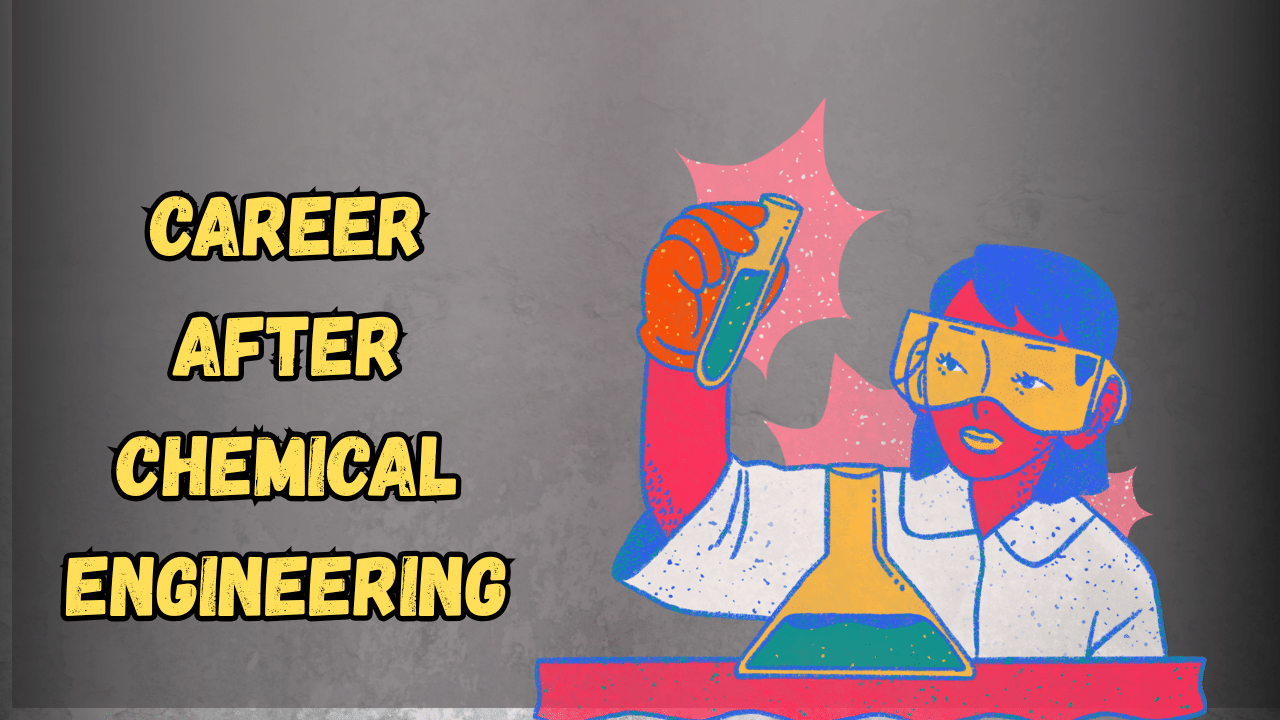Career after Chemical Engineering

Chemical engineering opens doors to more career options than most people realize. This guide is for current chemical engineering students, recent graduates exploring their options, and working engineers considering a career change.
Chemical engineers aren’t limited to oil refineries and pharmaceutical plants anymore. New industries are actively recruiting chemical engineers, from renewable energy companies to food tech startups. Many engineers also discover they can pivot into completely different fields like consulting, data science, or business development using their analytical skills.
We’ll explore traditional career paths that still offer strong opportunities, dive into emerging industries creating new roles for chemical engineers, and show you how to transition into non-engineering careers. You’ll also learn about specialized education options that can boost your earning potential and the key skills that make chemical engineers valuable across multiple industries.
Traditional Chemical Engineering Career paths

Process Engineering Opportunities in Manufacturing
Process engineers serve as the backbone of manufacturing operations, designing and optimizing systems that transform raw materials into finished products. These professionals work across diverse industries including pharmaceuticals, petrochemicals, food processing, and consumer goods manufacturing. Your daily responsibilities would involve analyzing production workflows, identifying bottlenecks, and implementing solutions to improve efficiency and reduce costs.
The pharmaceutical sector offers particularly exciting opportunities, where process engineers develop manufacturing methods for life-saving medications. You’ll work with complex equipment like bioreactors and purification systems, ensuring products meet strict regulatory standards. Petrochemical companies also provide robust career paths, where engineers optimize refinery operations and develop new processing techniques for fuels and chemical intermediates.
Manufacturing process engineers typically earn competitive salaries, with entry-level positions starting around $70,000-$85,000 annually. Experienced professionals can command $120,000 or more, especially in specialized industries or leadership roles. The role combines technical problem-solving with business acumen, as you’ll need to balance production efficiency with safety requirements and environmental regulations.
Career advancement often leads to senior process engineering roles, plant management positions, or specialized consulting opportunities. Many engineers also transition into project management, where they oversee large-scale facility upgrades or new plant construction projects.
Research and Development Roles in Chemical Companies
R&D positions represent the innovative frontier of chemical engineering, where you’ll develop next-generation materials, processes, and products. Major chemical companies like DuPont, 3M, and BASF invest heavily in research initiatives, creating opportunities for engineers to work on cutting-edge projects ranging from sustainable polymers to advanced battery materials.
Laboratory-based research roles involve designing experiments, analyzing data, and scaling laboratory discoveries to commercial production. You might spend your days developing new catalysts for chemical reactions, creating bio-based alternatives to traditional materials, or improving existing product formulations. These positions require strong analytical skills and comfort with sophisticated instrumentation like spectroscopy equipment and process simulation software.
Development engineers bridge the gap between laboratory research and commercial manufacturing. They take promising laboratory discoveries and figure out how to produce them at industrial scale while maintaining quality and cost-effectiveness. This work often involves pilot plant operations, where you’ll test processes at intermediate scales before full commercial implementation.
R&D careers offer unique intellectual satisfaction and the chance to create products that impact millions of people. Salaries typically range from $75,000-$95,000 for entry-level research positions, with senior scientists and research managers earning $130,000-$180,000 or more. Many companies also provide additional benefits like patent bonuses and conference travel opportunities.
Quality Control and Assurance Positions
Quality control and assurance roles ensure that products meet safety, performance, and regulatory standards before reaching customers. These positions are critical in highly regulated industries like pharmaceuticals, food production, and aerospace, where product failures can have serious consequences.
Quality control engineers develop testing protocols, operate analytical equipment, and interpret test results to verify product specifications. You’ll work with instruments like gas chromatographs, mass spectrometers, and materials testing equipment to analyze chemical composition, purity levels, and physical properties. Documentation plays a huge role, as you’ll maintain detailed records to satisfy regulatory requirements and support continuous improvement efforts.
Quality assurance focuses on the bigger picture, designing systems and processes that prevent quality issues before they occur. QA engineers audit manufacturing processes, train production staff on quality procedures, and investigate root causes when problems arise. They also work closely with regulatory agencies during inspections and product approvals.
The pharmaceutical industry offers particularly strong opportunities, where quality professionals ensure medications are safe and effective. Regulatory compliance knowledge becomes extremely valuable, especially familiarity with FDA guidelines, Good Manufacturing Practices (GMP), and validation procedures.
Starting salaries in quality roles typically range from $65,000-$80,000, with experienced quality managers earning $100,000-$140,000. The career path often leads to quality management positions, regulatory affairs roles, or consulting opportunities with companies seeking compliance expertise.
Plant Operations and Production Management
Production management roles put chemical engineers at the helm of manufacturing facilities, overseeing daily operations, managing teams, and ensuring safe, efficient production. These positions offer direct leadership opportunities and significant business impact, as production managers are responsible for meeting output targets while controlling costs and maintaining safety standards.
Plant operations involve coordinating multiple departments including production, maintenance, logistics, and quality control. You’ll manage production schedules, allocate resources, and troubleshoot equipment issues that could disrupt manufacturing. Strong communication skills become essential, as you’ll interact with everyone from equipment operators to senior executives.
Safety leadership represents a critical responsibility, especially in chemical manufacturing where hazardous materials and high-pressure systems create inherent risks. Production managers implement safety protocols, conduct regular training sessions, and investigate incidents to prevent future occurrences. Your engineering background provides the technical foundation to understand process hazards and implement appropriate control measures.
Many production managers eventually advance to plant manager roles, where they oversee entire facilities and report directly to corporate leadership. These positions offer substantial compensation packages, with plant managers at major chemical companies earning $150,000-$250,000 or more, plus performance bonuses tied to facility profitability and safety metrics.
The transition from technical roles to production management requires developing people management skills alongside your engineering expertise. Many companies provide leadership development programs to help engineers make this transition successfully.
Emerging Industries for Chemical Engineers

Renewable Energy and Sustainable Technology Sectors
The clean energy revolution has created exciting opportunities for chemical engineers to apply their expertise in developing next-generation energy solutions. Solar panel manufacturing requires deep understanding of semiconductor processes and materials science – skills that chemical engineers possess naturally. Wind energy companies need professionals who can optimize blade coatings, develop better lubricants, and improve energy storage systems.
Battery technology presents another massive growth area. Electric vehicle manufacturers and grid-scale storage projects desperately need experts who understand electrochemical processes, materials compatibility, and manufacturing scale-up. Chemical engineers are perfectly positioned to work on lithium-ion improvements, solid-state batteries, and emerging technologies like flow batteries.
Carbon capture and storage projects offer meaningful work addressing climate change while leveraging traditional chemical engineering skills. These roles involve designing separation processes, optimizing reaction conditions, and scaling pilot projects to commercial operations. Many energy companies are investing billions in these technologies, creating substantial job opportunities.
Hydrogen production and fuel cell development represent another frontier where chemical engineering fundamentals shine. From electrolysis optimization to fuel cell stack design, these emerging fields reward deep process knowledge and thermodynamics expertise.
Biotechnology and Pharmaceutical Innovation
Biotech companies increasingly value chemical engineers for their unique perspective on process optimization and scale-up challenges. While biologists understand the science, chemical engineers know how to make it work at commercial scale. This combination proves invaluable when taking laboratory discoveries to market.
Pharmaceutical manufacturing offers diverse career paths, from process development to quality assurance. Chemical engineers excel at designing efficient purification sequences, optimizing reaction yields, and troubleshooting production issues. The industry’s strict regulatory environment rewards systematic thinking and detailed documentation – core strengths of chemical engineering training.
Cell and gene therapy represents the cutting edge of medicine, but scaling these treatments requires serious engineering expertise. Companies working on CAR-T cell therapies or gene editing treatments need professionals who can design sterile manufacturing processes and ensure consistent product quality.
Synthetic biology companies are essentially engineering living systems to produce valuable compounds. This field combines biology with classic chemical engineering concepts like reactor design and downstream processing. Companies producing everything from sustainable materials to novel pharmaceuticals need chemical engineers who can bridge the gap between biological discovery and industrial production.
Environmental Engineering and Waste Management
Environmental consulting offers chemical engineers the chance to solve complex pollution problems while building diverse technical skills. Projects range from contaminated site remediation to air quality assessments, each requiring different applications of mass transfer, reaction kinetics, and separation processes.
Waste-to-energy facilities need engineers who understand both combustion processes and environmental regulations. These plants convert municipal solid waste into electricity while minimizing environmental impact – a perfect application for chemical engineering principles. The circular economy movement is driving demand for professionals who can design processes that turn waste streams into valuable products.
Water treatment technology continues evolving as communities face growing challenges with water scarcity and contamination. Chemical engineers design membrane systems, optimize chemical dosing, and develop new treatment processes. Advanced oxidation, membrane bioreactors, and desalination technologies all benefit from chemical engineering expertise.
Industrial ecology represents an emerging field where chemical engineers help companies minimize environmental impact while maintaining profitability. This work involves analyzing material flows, identifying waste reduction opportunities, and designing closed-loop systems where one process’s waste becomes another’s raw material.
Alternative career transitions beyond Traditional Engineering

Management Consulting for Technical Industries
Chemical engineers bring unique analytical thinking and problem-solving skills that consulting firms desperately need. Top-tier companies like McKinsey, BCG, and Bain actively recruit engineers for their technical expertise in manufacturing, energy, and chemicals projects. You’ll work with Fortune 500 companies to optimize operations, develop market entry strategies, and solve complex business challenges.
The transition requires developing business acumen and communication skills, but your technical background gives you credibility when discussing process improvements or technology implementations. Many former chemical engineers become partners at consulting firms, earning $300,000-$500,000+ annually while traveling globally and working on high-impact projects.
Patent Law and Intellectual Property Specialization
Your technical degree opens doors to patent law without requiring a complete career restart. Patent attorneys with engineering backgrounds are in high demand because they understand the science behind inventions. You can work at law firms, corporations, or the USPTO examining patent applications.
Most chemical engineers enter this field through patent agent certification first, then pursue law school part-time. Major tech companies like Google, Apple, and pharmaceutical giants pay patent attorneys $150,000-$300,000+ to protect their intellectual property. The work involves writing patent applications, conducting prior art searches, and providing legal opinions on patent validity.
Technical Sales and Business Development
Your engineering knowledge becomes a competitive advantage in B2B sales, especially for complex industrial equipment, chemicals, or process technologies. Companies need salespeople who can speak the customer’s technical language and understand their operational challenges.
Technical sales roles often lead to business development positions where you identify new markets, negotiate partnerships, and drive strategic initiatives. Successful technical sales professionals earn $120,000-$250,000+ through base salary plus commissions. Many eventually transition to executive roles like VP of Sales or Chief Commercial Officer.
Data Science and Process Analytics
Chemical engineers already think in terms of data analysis, optimization, and statistical modeling. Transitioning to data science leverages these skills while applying them to broader business problems. You can specialize in process analytics for manufacturing, predictive maintenance, or supply chain optimization.
Companies across industries seek data scientists with domain expertise in manufacturing and process industries. Learning Python, R, and machine learning frameworks positions you for roles paying $130,000-$200,000+. Many chemical engineers become lead data scientists at manufacturing companies or join tech firms building industrial IoT solutions.
Entrepreneurship and Startup Ventures
Your technical background provides the foundation for launching technology-focused startups. Chemical engineers have founded successful companies in cleantech, materials science, biotechnology, and process automation. You understand customer pain points in industrial settings and can develop solutions that actually work.
The startup ecosystem values technical founders who can build products and understand market needs. Many venture capital firms specifically seek entrepreneurs with engineering backgrounds. While risky, successful startup founders can achieve significant financial returns and professional satisfaction by solving meaningful problems.
Advanced Education and Specialization options

Graduate Degrees for Career Advancement
Pursuing a master’s degree opens doors to specialized roles and leadership positions that aren’t typically available with just a bachelor’s degree. An MS in Chemical Engineering allows you to dive deeper into specific areas like process optimization, nanotechnology, or environmental engineering. Many professionals choose this route to transition into research and development roles or to qualify for senior engineering positions.
MBA programs specifically designed for engineers have become increasingly popular. These programs combine technical knowledge with business acumen, preparing chemical engineers for management roles, consulting positions, or entrepreneurial ventures. The combination of engineering expertise and business skills creates a powerful competitive advantage in the job market.
Doctorate degrees (PhD) are essential for those interested in university teaching, cutting-edge research, or high-level consulting work. While the time commitment is significant (typically 4-6 years), PhD holders often command higher salaries and have access to prestigious positions in both academia and industry. Many companies actively recruit PhD graduates for their R&D departments and innovation teams.
Cross-disciplinary graduate programs are gaining traction. Chemical engineers are increasingly pursuing degrees in biomedical engineering, data science, environmental science, or even law (particularly patent law). These hybrid qualifications create unique career opportunities at the intersection of multiple fields.
Professional Certifications and Licensing Requirements
Professional Engineer (PE) licensure represents the gold standard for engineering credentials. While not required for all positions, PE license holders can legally approve engineering designs, take responsibility for public projects, and often earn 10-20% higher salaries. The process involves passing the Fundamentals of Engineering (FE) exam, gaining four years of qualifying experience, and passing the PE exam.
Project Management Professional (PMP) certification has become valuable for chemical engineers moving into leadership roles. This credential demonstrates your ability to manage complex projects, coordinate teams, and deliver results on time and within budget. Many Fortune 500 companies prefer or require PMP certification for senior project management positions.
Industry-specific certifications can set you apart in specialized markets. For example, Six Sigma certifications (Green Belt, Black Belt, Master Black Belt) are highly valued in manufacturing and process improvement roles. Lean Manufacturing certification demonstrates expertise in waste reduction and efficiency optimization.
Safety certifications like Certified Safety Professional (CSP) or Process Safety Management credentials are particularly relevant for chemical engineers working in high-risk industries. These certifications often lead to specialized safety engineering roles with competitive compensation packages.
Continuing Education for Industry Updates
The chemical engineering field evolves rapidly, making ongoing education essential for career success. Professional societies like AIChE (American Institute of Chemical Engineers) offer webinars, workshops, and conferences that provide both technical updates and networking opportunities. Many employers will fund participation in these events as part of professional development.
Online learning platforms have revolutionized continuing education. Coursera, edX, and LinkedIn Learning offer courses on emerging technologies like machine learning, artificial intelligence, and advanced process control. These skills are increasingly important as industries adopt digital transformation initiatives.
Industry conferences serve dual purposes: education and networking. Events like the AIChE Annual Meeting, Achema, or specialized symposiums in biotechnology or petrochemicals provide exposure to cutting-edge research and potential career opportunities. Building relationships at these events often leads to job opportunities or collaborative projects.
Company-sponsored training programs represent valuable opportunities for skill development. Many large corporations offer internal training on new technologies, leadership development, or cross-functional skills. Taking advantage of these programs demonstrates initiative and can accelerate career advancement within your current organization.
Technical journals and trade publications help you stay current with industry trends and breakthrough technologies. Regular reading of publications like Chemical Engineering Progress, Chemical & Engineering News, or specialized journals in your field ensures you remain knowledgeable about developments that could impact your career trajectory.
Building Essential Skills for Career Success
Leadership and Project Management Capabilities
Chemical engineers who can lead teams and manage complex projects stand out in today’s competitive market. Strong leadership goes beyond technical expertise – it’s about inspiring others, making tough decisions under pressure, and driving results through people. Developing these skills early in your career pays dividends later.
Start by taking on small leadership roles within your current projects. Volunteer to lead cross-functional initiatives, mentor junior engineers, or spearhead process improvement efforts. These experiences build confidence and demonstrate your ability to handle responsibility. Many companies offer formal leadership development programs, which provide structured learning opportunities and networking with other emerging leaders.
Project management skills complement leadership abilities perfectly. Learn popular methodologies like Agile, Scrum, or Six Sigma. These frameworks help you organize complex tasks, manage timelines, and deliver results consistently. Consider pursuing certifications such as PMP (Project Management Professional) or Lean Six Sigma, which employers highly value.
Budget management forms another crucial component. Understanding how to allocate resources, track expenses, and deliver projects within financial constraints makes you invaluable to any organization. Practice creating detailed project budgets and learn to identify cost-saving opportunities without compromising quality or safety.
Risk assessment and mitigation strategies separate good project managers from great ones. Chemical engineering projects often involve significant safety, environmental, and financial risks. Develop your ability to identify potential issues early, create contingency plans, and communicate risks effectively to stakeholders at all levels.
Digital Technology and Software Proficiency
The chemical industry is experiencing a digital transformation, and engineers who embrace technology gain significant competitive advantages. Modern chemical engineers need proficiency in various software tools, from traditional process simulators to cutting-edge AI applications.
Master industry-standard software like Aspen Plus, ChemCAD, or MATLAB for process simulation and optimization. These tools are fundamental in most chemical engineering roles and demonstrate your technical competence to employers. Don’t stop there – learn programming languages like Python, R, or SQL for data analysis and automation tasks. Python has become particularly valuable for process optimization, data visualization, and machine learning applications.
Data analytics skills are increasingly important as companies collect vast amounts of operational data. Learn to use tools like Tableau, Power BI, or Excel’s advanced features to create meaningful insights from complex datasets. Understanding statistical analysis and being able to present findings clearly to non-technical audiences makes you incredibly valuable.
Automation and process control knowledge opens doors in manufacturing environments. Familiarize yourself with distributed control systems (DCS), supervisory control and data acquisition (SCADA) systems, and programmable logic controllers (PLCs). Companies are investing heavily in smart manufacturing and Industry 4.0 initiatives, creating demand for engineers who understand these technologies.
Cloud computing platforms like AWS, Microsoft Azure, or Google Cloud are becoming standard in many organizations. Basic understanding of cloud services, data storage solutions, and collaborative platforms helps you work more effectively in modern engineering environments.
Communication and Interpersonal Skills Development
Technical brilliance means little if you can’t communicate your ideas effectively. Strong communication skills distinguish successful chemical engineers from those who struggle to advance their careers. These skills become even more critical as you move into senior roles where you’ll interact with diverse stakeholders.
Written communication deserves particular attention. You’ll write technical reports, project proposals, safety procedures, and regulatory documentation throughout your career. Practice writing clearly and concisely, avoiding unnecessary jargon. Learn to tailor your writing style to your audience – what works for fellow engineers might confuse executives or regulatory officials.
Presentation skills are equally important. You’ll present findings to management, explain processes to operators, and potentially speak at conferences or industry events. Practice regularly, focusing on clear structure, engaging delivery, and effective use of visual aids. Join organizations like Toastmasters to develop confidence and receive constructive feedback.
Active listening often gets overlooked but proves crucial for building relationships and understanding problems thoroughly. When team members, customers, or suppliers share concerns, give them your full attention. Ask clarifying questions and summarize what you’ve heard to ensure understanding. This approach builds trust and helps you gather better information for decision-making.
Emotional intelligence helps you navigate workplace relationships more effectively. Develop awareness of your own emotions and reactions, and learn to recognize emotional cues from others. This skill becomes particularly valuable when dealing with conflicts, managing change, or working with stressed team members during challenging projects.
Cross-Functional Collaboration Abilities
Modern chemical engineering projects rarely exist in isolation. You’ll work with professionals from various disciplines, each bringing different perspectives, priorities, and communication styles. Success depends on your ability to collaborate effectively across these boundaries.
Learn to speak the language of other departments. Understand how finance professionals evaluate projects, what concerns safety managers have, and how marketing teams think about customer needs. This knowledge helps you frame your ideas in ways that resonate with different audiences and build stronger support for your initiatives.
Develop cultural awareness, especially if you work for multinational companies. Different cultures have varying approaches to hierarchy, decision-making, and conflict resolution. What works well with American colleagues might not be effective with Japanese or German team members. Take time to understand these differences and adapt your approach accordingly.
Conflict resolution skills prove invaluable when working across functions. Different departments often have competing priorities – operations wants maximum production while maintenance prefers longer shutdown windows. Learn to identify common ground, facilitate productive discussions, and help teams find win-win solutions.
Building relationships proactively rather than reactively makes collaboration much easier. Invest time in getting to know colleagues from other departments during normal business periods, not just when you need their help on urgent projects. Understanding their challenges and constraints helps you work together more effectively when pressure increases.
Virtual collaboration skills have become essential in today’s work environment. Master video conferencing etiquette, learn to facilitate effective online meetings, and become comfortable using collaborative platforms like Microsoft Teams, Slack, or similar tools. Remote work isn’t disappearing, so these skills will serve you throughout your career.
Maximizing Career growth and Salary potential

Strategic Job Hopping for Advancement
Chemical engineers who stay in one position too long often find their salaries stagnating. The most successful professionals understand that strategic job changes every 3-5 years can accelerate both career progression and compensation growth. Each move should represent a clear step forward—whether that’s a promotion in title, increased responsibility, or a salary bump of 15-25%.
When planning your next move, focus on companies that value your existing experience while offering new challenges. Target roles that expand your skill set or expose you to different industries. For example, moving from petrochemicals to pharmaceuticals broadens your expertise and makes you more marketable. Document your achievements quantitatively before interviews—saved costs, improved efficiency percentages, or successful project completions create compelling talking points.
Timing matters significantly. The best opportunities often emerge during industry upswings or when companies launch new initiatives. Keep your LinkedIn profile updated and maintain relationships with recruiters who specialize in chemical engineering placements. They often know about openings weeks before they’re publicly posted.
Networking and Professional Association Membership
Professional relationships drive career advancement more than technical skills alone. Chemical engineers who invest time in networking consistently access better opportunities and command higher salaries. Start with the American Institute of Chemical Engineers (AIChE), which offers local chapters, technical divisions, and annual conferences where industry leaders gather.
Beyond AIChE, consider joining specialized groups based on your industry focus. The International Society of Pharmaceutical Engineers (ISPE) serves biotech and pharma professionals, while the American Chemical Society (ACS) provides broader chemistry networking. These organizations offer continuing education, leadership opportunities, and direct access to hiring managers.
Active participation matters more than passive membership. Volunteer for committees, present at conferences, or write articles for trade publications. These activities establish your expertise and keep your name visible among industry peers. Many senior positions get filled through personal recommendations rather than job postings.
Don’t overlook informal networking through alumni associations, local business groups, or even LinkedIn communities. Former colleagues who advance to management positions often become valuable connections for future opportunities.
Geographic Considerations for Opportunities
Location significantly impacts both career trajectory and earning potential for chemical engineers. Traditional chemical hubs like Houston, Louisiana’s Chemical Corridor, and Delaware offer numerous opportunities but also intense competition. These regions typically provide 10-20% higher salaries to offset living costs and attract talent.
Emerging markets present different advantages. States like North Carolina, Ohio, and Pennsylvania offer lower living costs while developing robust chemical industries. Some professionals find better work-life balance and faster career progression in these growing markets compared to established hubs.
International opportunities can dramatically boost earnings and experience. Middle Eastern countries often offer tax-free salaries plus housing allowances for experienced chemical engineers. Singapore and other Asian markets provide exposure to rapidly growing economies and different business practices.
Consider the total compensation package beyond base salary. Some locations offer significant cost-of-living adjustments, relocation bonuses, or stock options that substantially impact your financial outcome. Remote work options have also expanded geographic flexibility, allowing you to access high-paying positions without relocating.
Research industry trends in target locations. Areas investing in renewable energy, advanced manufacturing, or biotechnology may offer better long-term prospects than regions dependent on declining sectors.

Chemical engineering opens doors to an incredible range of career possibilities that go far beyond the traditional manufacturing and petrochemical industries. From cutting-edge biotechnology and renewable energy to data science and consulting, your engineering foundation gives you the analytical thinking and problem-solving skills that countless industries value. The key is recognizing that your degree doesn’t lock you into one path – it’s actually your ticket to exploring diverse fields where technical expertise meets innovation.
The job market rewards chemical engineers who stay curious and keep learning. Whether you choose to specialize through advanced degrees, pivot into emerging sectors like clean technology, or leverage your skills in unexpected areas like finance or healthcare, success comes down to building the right mix of technical knowledge and soft skills. Take charge of your career by networking actively, staying current with industry trends, and being open to opportunities that might not look like traditional engineering roles on paper. Your chemical engineering background is a powerful foundation – now it’s time to build something amazing on top of it.







